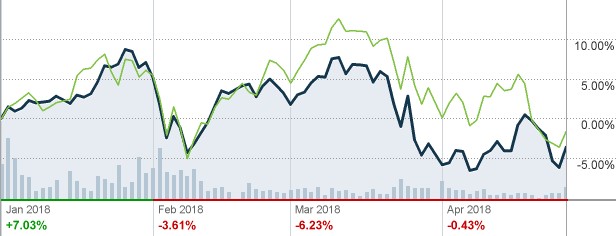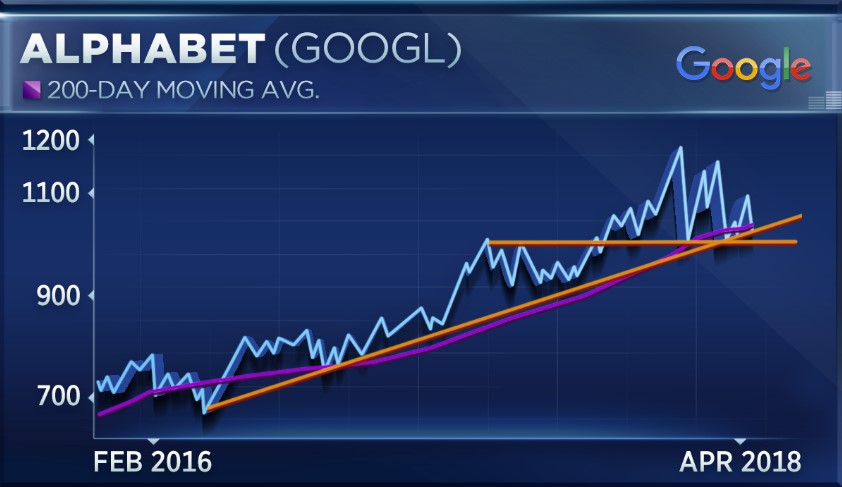The FANG quartet of Facebook, Amazon, Netflix and Google has been one of the best growth stories of the nine-year bull market—even if the FANG market barometers has been pretty lifeless in the year to date.
The tech stocks, once favored for their strong earnings growth, have underperformed utility defensive stocks.
Part of the reason is that investors prefer utility to tech stocks during times of uncertainty due to their indifference to economic cycles and regular dividend payments. Many tech companies do not pay a dividend, preferring instead to plough back their earnings into growth ventures.
FNG ETF vs. Technology Select Sector ETF(XLK)

(Click to enlarge)
Source: CNN Money
Just last week, FANG stocks lost nearly $90 billion in combined market cap as worries about potential government regulation continued to weight them down.
But those negative sentiments have suddenly melted away after the four companies reported impressive Q1 results that topped Wall Street estimates. Here's a recap of their first quarter earnings:
Regarding Facebook, it's perhaps ironic that the same company that has been pulling down FANG has also posted the best results of the group. Facebook stock was up nearly 10 percent in the after-market after the company reported blowout results that easily exceeded analysts' consensus. Related: The Three Biggest Threats To Bitcoin
Revenue came in at $11.97 billion, 49 percent year-over-year growth and $560 million above Wall Street consensus, while net income improved 63 percent to nearly $5 billion. Monthly Active Users (MAUs), a closely-watched metric, increased 13 percent, in-line with estimates. Facebook has been facing a severe backlash over its use of user data and investors feared that users might decide to jump ship. Indications so far suggest that these fears have been overdone.
Amazon managed another huge beat after posting revenue of $51.04 billion, up 42.9 percent Y/Y and $1.26 billion above the consensus. Net income more than doubled to $1.6 billion thanks to continued growth by the company's AWS cloud business, which provided 73 percent of total operating income. AWS' revenue increased 49 percent during the quarter, considerably faster than the low-40s average clip over the past couple of quarters.
Netflix stock has been the standout performer of the group after racking up gains of 66 percent in the year-to-date. The company's Q1 report card did not disappoint either: Revenue of $3.7 billion, up 40.2 percent Y/Y and $10M above estimates; net income of $290 million, good for 63 percent growth, while paid membership increased 26 percent to 118.9 million.
Google's parent company Alphabet reported Q1 revenue of $31.15 billion, a 25.6 percent Y/Y improvement compared to last year's corresponding period and $870 million better than the consensus on Wall Street. Net income of $9.4 billion represented a 73 percent Y/Y increase.
GOOG Stock Raises a Red Flag
Though good by most yardsticks, it's hard to miss the fact that Alphabet reported the weakest results of the FANG companies. Due to a new accounting rule, the company reported a one-time gain of $3 billion on equities securities, which is likely due in large part to its 2013 investment in Uber. Without this item the company's bottom line would have grown a more modest 18.5-percent clip.
Meanwhile, the company's traffic acquisition costs (TAC), an important line-item, increased to 24 percent of Google's advertising revenue.
CFO Ruth Porat attributed this to growing mobile and programmatic advertising which have higher TAC. The two are long-term secular trend which implies Google's TAC is set to continue climbing.

(Click to enlarge)
Source: CNBC Related: Is Gold A Commodity Or Currency?
These worries have been weighing down on GOOG stock which closed below its 200-day moving average on Tuesday for the first time since 2016. This could potentially open up a deep slide if anything triggers another downtrend.
As for the rest of the FANG group, there just doesn't seem to be a lot of downward risk at the moment. And that goes for FB, too-- another quarter like that and the data scandal will be all but forgotten.
By Alex Kimani for Safehaven.com
More Top Reads From Safehaven.com:

















